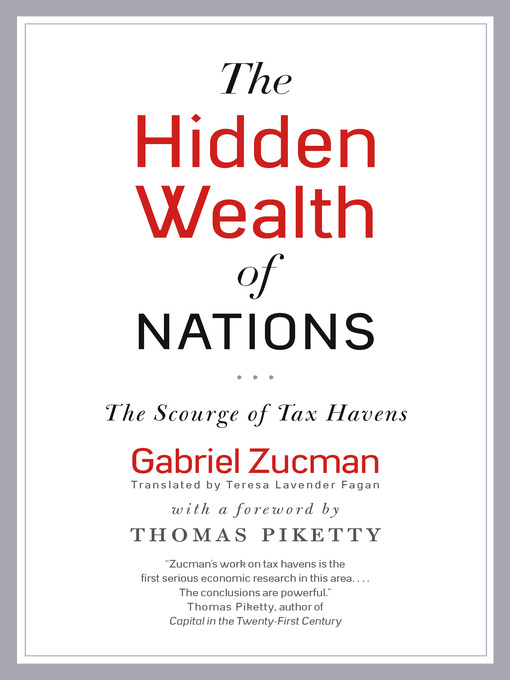
The Hidden Wealth of Nations
The Scourge of Tax Havens
کتاب های مرتبط
- اطلاعات
- نقد و بررسی
- دیدگاه کاربران
نقد و بررسی

Starred review from September 15, 2015
Zucman (economics, London Sch. of Economics) dissects the history and current state of global tax havens. Using data from the Swiss National Bank, he estimates that around eight percent, or $7.6 trillion, of global household financial wealth is held in tax haven accounts. Zucman focuses on Switzerland but traces the financial tendrils extending through Luxembourg, the Cayman Islands, and Hong Kong, and various other places. He estimates that ultra-high-net-worth individuals use the tax havens to avoid paying some $200 billion annually to their resident countries, explaining that this means higher taxes for everyone else. The author suggests several corrective measures including enforced sharing of banking information and taxing income generation at the source. While his analysis is academic, Zucman writes crisply and is forthright in his scorn for tax fraud. He also briefly addresses solutions to corporate tax manipulation, whereby multinationals shift income to tax havens. VERDICT Zucman's eye-opening study will be of interest to all readers concerned about growing wealth disparity and is a fitting supplement to Capital in the Twenty-First Century by Thomas Piketty, who writes the foreword to this book.--Lawrence Maxted, Gannon Univ. Lib., Erie, PA
Copyright 2015 Library Journal, LLC Used with permission.

September 15, 2015
Zucman (economics, London Sch. of Economics) dissects the history and current state of global tax havens. Using data from the Swiss National Bank, he estimates that around eight percent, or $7.6 trillion, of global household financial wealth is held in tax haven accounts. Zucman focuses on Switzerland but traces the financial tendrils extending through Luxembourg, the Cayman Islands, and Hong Kong, and various other places. He estimates that ultra-high-net-worth individuals use the tax havens to avoid paying some $200 billion annually to their resident countries, explaining that this means higher taxes for everyone else. The author suggests several corrective measures including enforced sharing of banking information and taxing income generation at the source. While his analysis is academic, Zucman writes crisply and is forthright in his scorn for tax fraud. He also briefly addresses solutions to corporate tax manipulation, whereby multinationals shift income to tax havens. VERDICT Zucman's eye-opening study will be of interest to all readers concerned about growing wealth disparity and is a fitting supplement to Capital in the Twenty-First Century by Thomas Piketty, who writes the foreword to this book.--Lawrence Maxted, Gannon Univ. Lib., Erie, PA
Copyright 2015 Library Journal, LLC Used with permission.

























دیدگاه کاربران